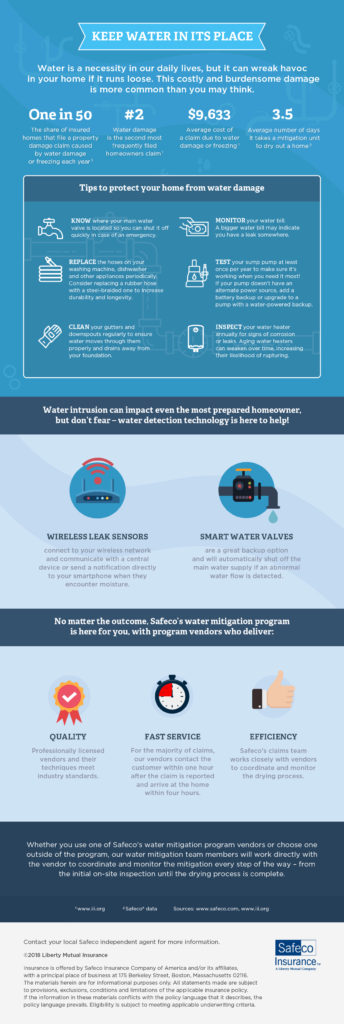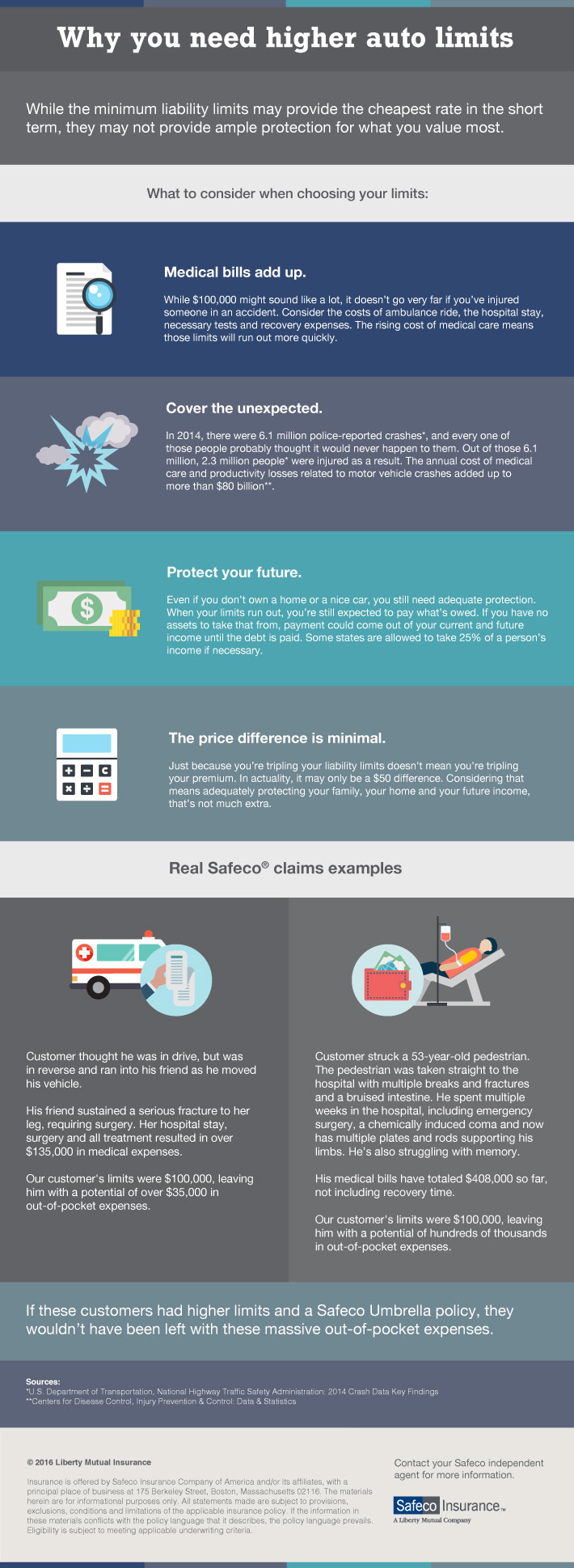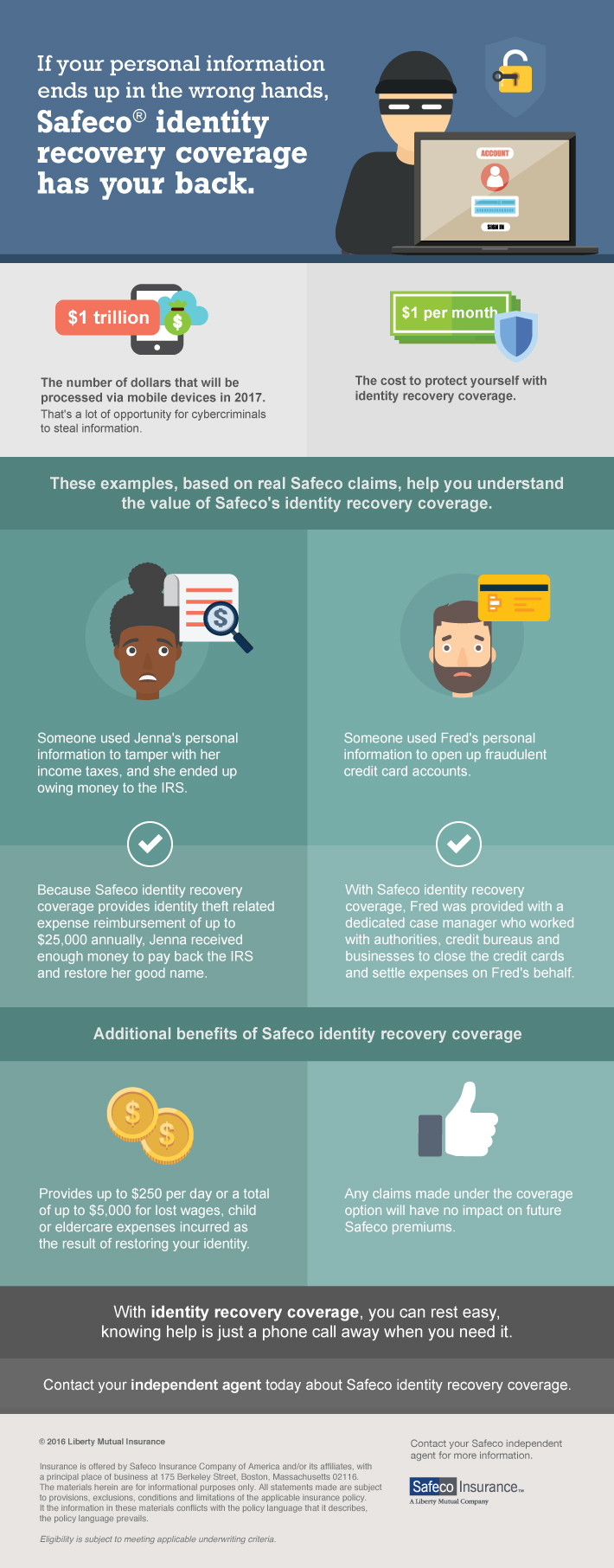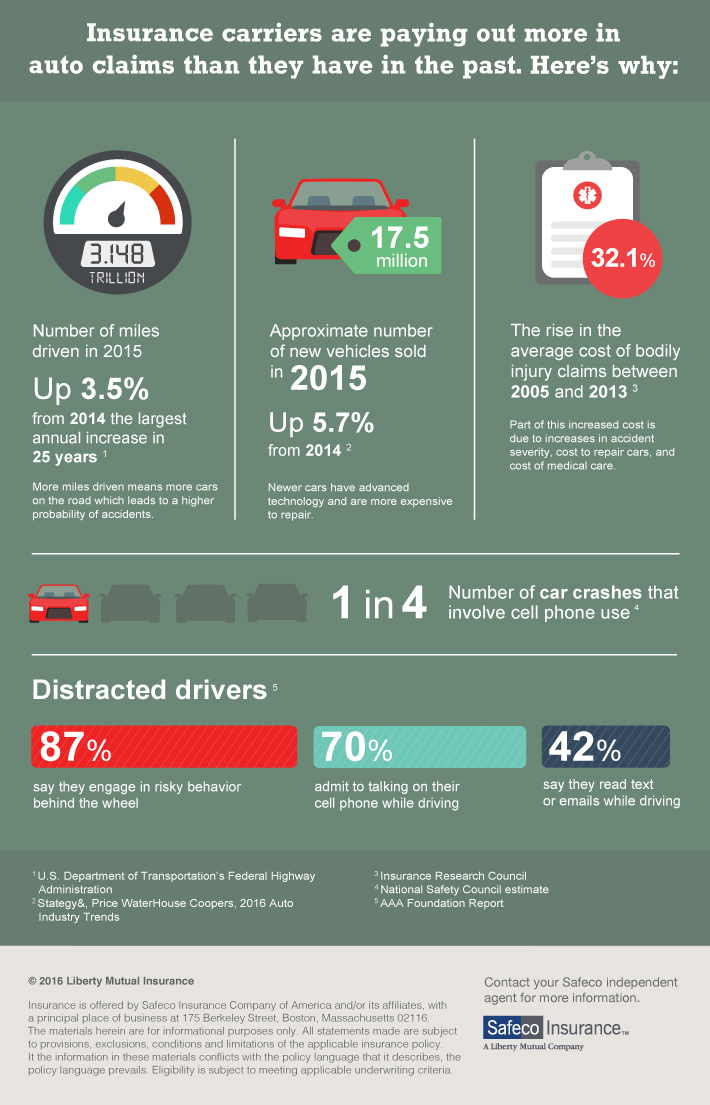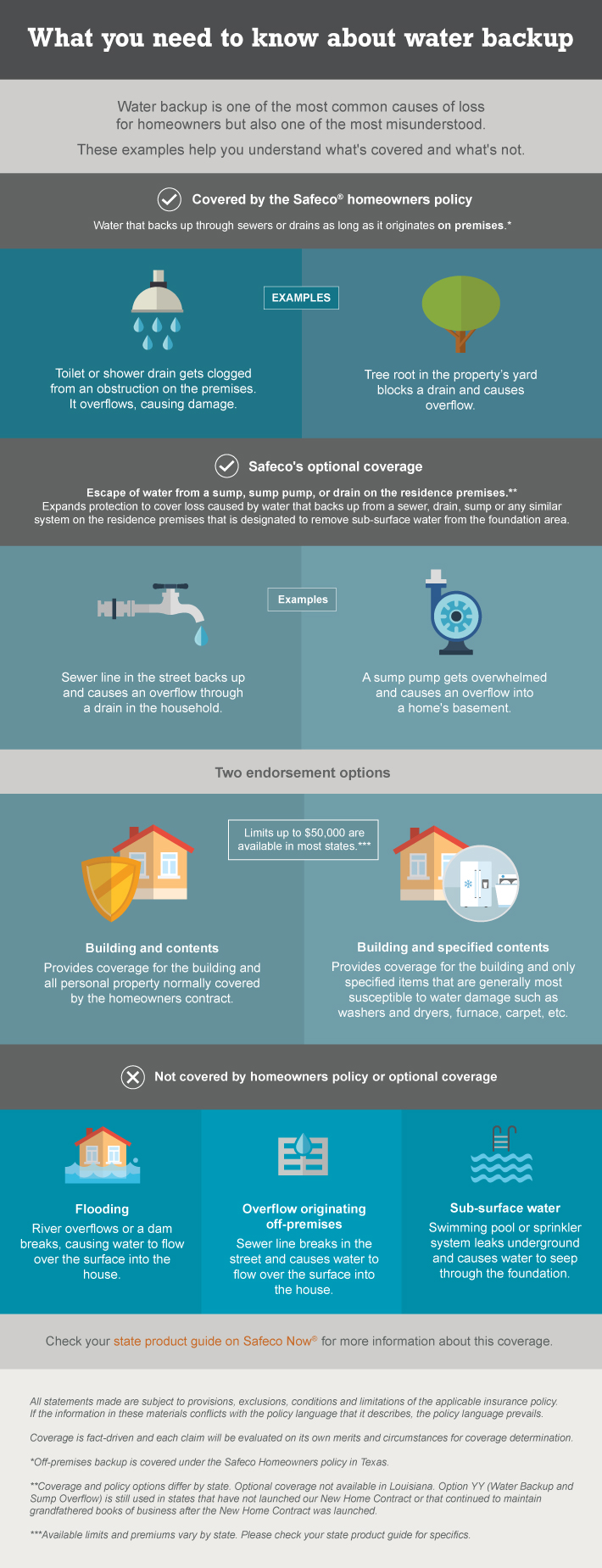Did you know that water damage is the second most frequently filed loss experienced by homeowners and renters each year? (according to the Insurance Information Institute) The infographic below, provided by Safeco, can help you understand the risks, offer prevention tips and share the resources you may need if a water loss occurs.
Author: Linda Grissett
Why You Need Higher Auto Liability Limits
When deciding which auto liability limits to select on your auto insurance policy, your premium should be secondary. Your primary thought in selecting your liability limits should be protecting your assets and yourself from potential legal liability and avoid exposing yourself to costly lawsuits or judgments. Minimum insurance limits should only be selected if that is truly all you can afford. Once your budget allows, be sure to increase your limits and also consider purchasing an umbrella policy. It is not as expensive as you may think and it could save you during a claim!
Identity Fraud Coverage
Many of us have been victims of identity fraud, or known someone who has. It is a grueling and time consuming process to try to restore your identity and clean up the mess left behind by the criminal(s). Identity Recovery or Identity Fraud Expense Coverage is offered by many homeowner’s insurance companies to guide you through the process and reimburse you for many of the expenses you incur along the way. The infographic below gives additional details regarding Safeco’s optional coverage:
How Equipment Breakdown Coverage Can Help You
If you are a homeowner and either currently have a home warranty plan or would like to have one if it were less expensive, then you need to read this! More and more insurance companies are offering an optional endorsement that provides much of the same coverage as popular home warranty policies. These plans are often provided to a home buyer by the seller when purchasing an existing home. Some homeowner’s continue to renew these plans while some choose to allow them to expire due to the annual cost. Many insurers now offer this protection at a lower cost, when endorsed onto a homeowner’s insurance policy. The following infographic gives an overview of what is covered by Safeco’s Equipment Breakdown endorsement, including examples of what is and what is not covered.
Contact LG Insurance Group if you would like to learn about this valuable coverage!
Why Auto Insurance Premiums are Increasing
Allstate grabbed Georgia headlines last May with less than favorable news that one of their auto insurance programs would be raising premiums by an average of 25%. This is much higher than what we are seeing within our markets, however, we are seeing increases by all carriers this year. The most common or typical increase we are seeing is about 9 to 10%. Given the significant premium changes, we wanted to share what is driving this trend through this infographic. All of these factors may not be in our control, however, a few are such as the ever distracted driver. How many drivers do you see every day talking or texting on their phone? Be sure that you are not one of these drivers and be an example for your family and friends. Whatever small part we can play to mitigate traffic fatalities and losses will help us all.
What can you do today to alleviate an increase you recently experienced? Compare – Compare – Compare! With multiple markets at our disposal, we would love to help you find out just how much you may be able to save. Contact us today!
Is Water Backup covered by my Homeowner’s Policy?
Water and Sewer Backup coverage is one of the more important optional coverages that you should consider adding to your homeowner’s insurance policy. The infographic below shows how some common water losses are handled by Safeco Insurance. It details how certain water (backup) losses are handled by their base homeowner’s policy, an optional endorsement for Water/Sewer Backup, or excluded entirely. While you always need to check your specific policy and insurer, these examples are common across many carriers.
Home-Buying Tips for the Single Guy and Gal
Who says you need to be married to purchase a home? According to Bloomberg.com, single Americans make up more than half of the adult population—and many of them want to create their own version of the American Dream. Contacting a Trusted Choice® agent can be the key to success for single folks who are in the market to purchase a home, but here are some things to consider in the meantime.
The Lone Ranger
Whether you’re single or married, purchasing a home has its challenges. It’s important to be fully armed with information in order to cultivate a plan that works for you.
To start, make a list of your current monthly expenses, take a gander at your savings account and evaluate your personal and professional goals. When you list your monthly expenses, be sure to consider pending expenses. If you’re fresh out of college, you probably haven’t felt the sting of paying student loans every month and going to work every day. If you have only saved enough for a down payment, think again—moving expenses like rental trucks and purchasing new household items can add up quickly.
Finally, don’t forget about life goals outside purchasing a home—if you plan to start a business or retire in three to five years, owning a home should probably be a dream deferred.
Lending a Helping Hand
The majority of homeowners obtain financing through a bank loan. When a married couple applies for a home loan, the bank can depend on two incomes to pay the loan back. But a single person must qualify and handle making the same payments alone. According to Time.com, “Banks are not allowed to discriminate based on marital status, but tighter lending standards can potentially pose a challenge to single buyers because they only have their own income to qualify for a loan.”
Before applying for a bank loan, be sure to tighten up your credit, pay off as many debts as possible and save a nice nest egg in order to show the bank that you don’t need another person to help you repay your loan.
Protect Yourself
You will likely need to obtain homeowners insurance in order to secure financing from the bank, but don’t wait until you apply for a loan to get insurance. A Trusted Choice agent can be a valuable resource right from the start by giving you tips and connecting you with lenders, realtors and home inspectors—they work with these people on a regular basis.
Being single doesn’t mean you’re alone. A Trusted Choice Agent is the best partner you can have when you’re ready to buy your dream home
SOURCES:
https://www.trustedchoice.com/homeowners-insurance/
http://time.com/money/2894989/single-and-thinking-of-buying-a-home-heres-some-advice/
Safety Makes Your Summer Party Memorable—In the Right Way
 The entertainment value in a summertime get-together can be in the camaraderie and storytelling. But don’t let your next backyard barbecue turn into a tale of woe, to be retold years from now.
The entertainment value in a summertime get-together can be in the camaraderie and storytelling. But don’t let your next backyard barbecue turn into a tale of woe, to be retold years from now.
One party hostess recalled a disastrous event that involved hot oil, alcohol, a paper tablecloth and fireworks: “The oil to fry the turkey was too hot and too full. Maybe it had to do with the over-served [read: one too many alcoholic beverages] cook. But once the turkey went in, the oil bubbled over, caught the paper tablecloth on fire, and lit the grass on fire.”
The grass fire then ignited a pile of fireworks, which were supposed to be on the porch. This in turn “led to one huge fireball, screaming crying children who will probably never recover from the panic that was set throughout, which then led to roof catching on fire.”
The damage tally was: one home partially destroyed, several cars damaged by smoke, a missing dog, $2,500 worth of poorly timed fireworks and three acres of burned grass. The lessons learned, reported the wiser hostess: “We now monitor everyone’s booze intake, park cars far away, and only have one person know where the fireworks are. And I now cook the turkey with fire extinguishers nearby.”
Summer is truly party time in America. But homeowners should be aware of the risks associated with these get-togethers. Before reviewing safety tips, let’s look at three common risks for which a homeowner might need insurance coverage:
Liquor liability: Summer parties can be a breeding ground for drinking-and-driving accidents. Most homeowners know that they bear some responsibility if a guest becomes impaired after consumer alcoholic drinks at the homeowner’s house, and then causes a car accident. If the party-giver is sued, however, his/her homeowners and automobile insurance policies may not provide liability coverage. (Keep in mind that the legal defense against a claim is another significant expense for anyone who is sued in such a circumstance.)
Changes to homeowners insurance standard contracts made in 2000 may limit the coverage available under a homeowners policy. Homeowners might be well served to check their homeowners and auto insurance policies (contacting their agent, if necessary) to determine what protection they may have.
Personal accidents on the homeowner’s property: A homeowners policy and an excess liability policy (dubbed an “umbrella” policy) provide broad protection for accidents on the party host’s property. For instance, if a guest tumbles down the steps of an outdoor deck or a child is burned by the outdoor grill, the homeowners policy would pay medical costs for the guest (and, should a lawsuit follow, likely would pay the costs of defending against the lawsuit and damages awarded in the case).
No one, of course, wants to see such events occur, but accidents do happen. Homeowners coverage is designed to “make whole” a homeowner who is facing a liability claim due to an accident on his or her property.
Property damage liability: When guests drive to your party and park their cars at your home, the homeowner assumes risk. The possibilities of property damage range from a simple dent from a stray baseball, to a young driver releasing the parking brake and rolling the car into a tree, to an impaired driver going for a joy ride and damaging the car. A different example of property damage is the theft of a guest’s purse/wallet or valuable articles from the party-giver’s property.
Homeowners coverage pays for damage to another person’s property, if the homeowner is held liable. A homeowner’s negligence and omissions (i.e., failing to take steps that might have prevented an incident) are reasons that he or she can be found liable for damage to another person’s property.
To prevent accidents, consider some sensible safety precautions:
Grilling
Some 5,000 people are injured by charcoal, wood-burning and propane grill fires each year, according to the U.S. Fire Administration of the Federal Emergency Management Administration. Good safety practices include:
§ Before using a propane gas grill, check the connection between the tank and the fuel line. Make sure the Venturi tubes (where the air and gas mix) are not blocked, and check hoses for cracks or damage.
§ Never use a propane barbecue grill on a balcony, terrace or roof. And never grill/barbecue in enclosed areas, as deadly carbon monoxide can be produced.
§ Keep a fire extinguisher or a source of water (a garden hose or four-gallon pail of water) near an outdoor grill or barbecue.
§ While barbecuing, don’t wear loose clothing. Use long-handled barbecue tools and/or mitts that are flame resistant.
§ Don’t squirt flammable liquids onto an open flame.
§ Don’t leave a grill unattended.
§ Keep matches and lighters away from children. Supervise children around outdoor grills, which are objects of curiosity.
§ If using a charcoal or wood fire, dispose of hot coals properly by soaking them with water, then stirring to ensure that fire is extinguished. Never place them in plastic, paper or wooden containers.
§ Keep alcoholic beverages away from the grill since they are flammable.
Drinking
Liquids containing alcohol cause the human body to lose more fluid, say health educators. So summertime drinking in the sun or heat can present hazards to health, including impaired judgment, balance and coordination. Consider these safety tips if serving:
§ Use designated drivers.
§ Make non-alcoholic beverages as available as alcoholic drinks.
§ Stop serving alcohol before the party ends.
§ If children are attending the event, remember that alcohol may seem more available to them at a party.
Dining outdoors
Food-borne illnesses favor the hot conditions found at outdoor events where food is not refrigerated or may be undercooked. The U.S. Department of Agriculture offers food safety tips:
§ Cook foods thoroughly to safe minimum internal temperatures.
§ Keep hot foods hot and cold foods cold. Hot foods should be heated and maintained at 140 °F or warmer with chafing dishes, slow cookers, and warming trays. Cold foods should be held at 40 °F or colder. Maintain cold by placing food dishes in bowls of ice or in a cooler.
§ Live by the “two-hour rule”: Foods should not sit at room temperature for more than two hours.
(Source: Trusted Choice)
What Factors Impact your Homeowner’s Insurance Premium?
Have you ever wondered what determines your homeowner’s insurance premiums? Why the new house you just bought is $1,000 less (or more) for homeowner’s insurance than the home you just sold? All insurers have their own unique model, or calculation, to determine your premium and many try to find unique variables to make their company better at determining the “right” premium for your home. So while we are unable to list all the possible variables, let’s review the most common and perhaps the most significant ones.
1) Dwelling Limit – this is the amount of coverage needed to rebuild your home. Of course many factors also go into determining the right coverage limit for your home such as square footage, quality of construction, building materials, etc.
2) Your Financial Insurance Score – this is not your credit score, but is still based on your credit history. Insurers have found that the handling of one’s credit and bill payment history is predictive of future losses.
3) Your location – Is your home located in an area prone to tornados, blizzards, hurricanes or other natural disasters? Is there a high frequency of burglaries or vandalism? In addition to weather and crime statistics, another variable related to your location is the distance to your home and quality of your local fire department which is called your fire protection classification.
4) Year Built – A homeowner that has lived in a home long enough knows this unfortunate fact; the older a home, the more “things” happen. It could be a burst pipe, worn electrical wiring or a number of other issues that arise over time. While homeowner’s insurance may not cover “wear and tear,” many of the sudden damages caused by these issues are, such as water damage caused by the burst pipe. The surcharge of older homes can be minimized, however, with replacement of or updates to major household systems such as furnaces, roof, plumbing and electrical wiring.
5) Exterior Construction – The materials utilized to build your home are considered in both risk and ease of replacement. For example wood homes are more susceptible to fire and water damage than brick homes. Conversely, if you were looking to add an earthquake endorsement or policy to your insurance plan, then wood homes usually withstand this disaster better than brick homes. Insurers also look at the supply of materials used in your home’s construction. Imported or limited supply materials are going to carry a heavier expense.
6) Security Features – The measures you take to minimize or avoid damage to your home can reward you with additional discounts on your homeowner’s insurance. The most common ones include centrally monitored burglary and/or fire alarms, smoke detectors, fire extinguishers and deadbolt locks on your exterior doors.
7) Liability Exposures – Insurers consider any features to your home that may increase the likelihood of others to sustain injuries on your property. Common examples of such features would include pools, trampolines and pets.
8) Claim or Loss History – If you have filed a claim within the recent past, most likely any insurer will surcharge you for the next several years. The type of loss you had will also impact the amount of the surcharge, with a weather related loss being far less costly than other causes of loss. If you were unfortunate to have multiple losses within a small period of time, then you will also probably find the ability to attain a new policy more challenging for at least a few years. Additionally, claim history follows you from one home to the next, so if you ever wonder if you should turn in that “small” claim, you should call your independent agent to help you weigh the pros and cons.
9) Coverage and Deductibles – Not all homeowner’s insurance policies are the same. Many carriers offer multiple levels of coverages, from “bare bones” to “robust” to suit your needs, budget and level of risk tolerance. Additionally your deductible, or the amount that you cover of a loss before your insurance begins to pay, also has a significant impact on your premium. The more you “self insure,” the less your insurance premiums will be.
We hope this helps you gain a little insight into your homeowner’s insurance premiums. While not all are in your direct control, perhaps understanding some of the variables utilized can help you take steps to minimize your homeowner’s insurance premium through either prudent home improvements or reviewing your coverages and deductibles with your independent insurance agent.
Does your Personal Auto Insurance Extend to Rental Cars?
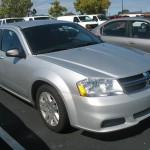 Generally speaking, the answer to this question is yes. Of course, nothing can ever be as simple as yes or no, so there are key considerations as well as exceptions to this answer.
Generally speaking, the answer to this question is yes. Of course, nothing can ever be as simple as yes or no, so there are key considerations as well as exceptions to this answer.
First, the broadest coverage on your auto insurance is what will apply to a rental vehicle. So, if you do not have Comprehensive or Collision coverage on any of your insured vehicles, then these coverages will not extend to a rental vehicle.
Second, the vehicle you are renting needs to be considered a private passenger auto. Typically, this would exclude any commercial vehicles, motorcycles, RVs, boats, etc. So the next time you rent a U-Haul truck for moving across town, you should add their insurance coverage.
Third, there are territorial restrictions on your auto policy. Most auto policies will cover you while you are in the United States or Canada. However, outside of these countries, your auto policy will not apply.
Fourth, for your personal auto policy to extend coverage, then the vehicle needs to be rented for personal use, and not business use. If you need to rent a vehicle due to your job or for any business reason, your employer or a business auto policy would need to extend coverage to your rented vehicle.
Lastly, of course, always check with your insurance agent or carrier. Each company has a slightly unique policy so you want to ensure you are covered before you start driving the rental vehicle.
So what if you run into one of the exceptions and your auto policy will not extend to a rental vehicle? Here are some possible alternatives to explore.
First, research your credit cards. Many credit car companies offer a benefit to provide auto insurance to a rental vehicle if you use their card to pay for it. Be sure to call your credit car company for their exact requirements and specifications before you rent the vehicle. For example, if you are traveling to Ireland, the insurance requirements are more unique than in other countries, so only a limited number of credit car companies offer coverage necessary to cover rentals there.
Second, consider travel insurance. Travel insurance providers can include rental vehicle insurance as part of their overall coverage package.
Finally, you always have the option of purchasing the insurance directly from the rental car company. Though we would all like to avoid the additional hefty fees for this, there will be times when this may be your only option.








 Click to Call
Click to Call Get Directions
Get Directions